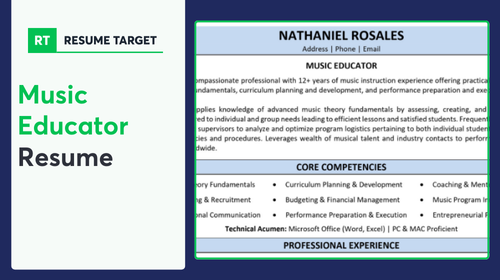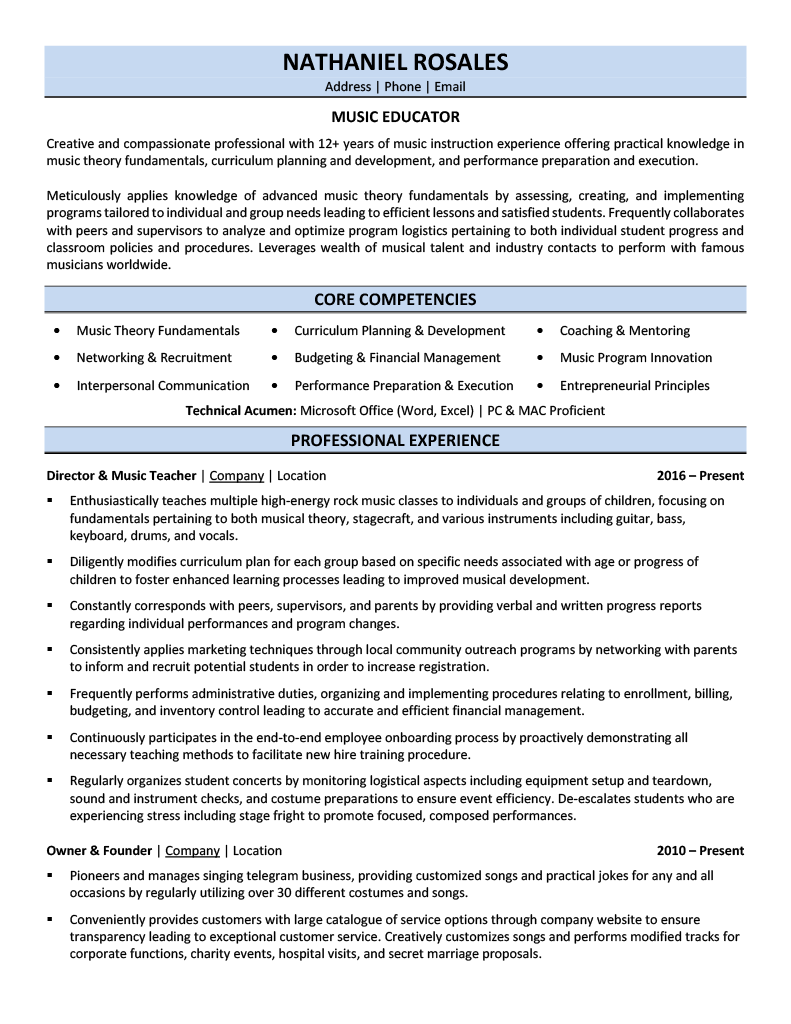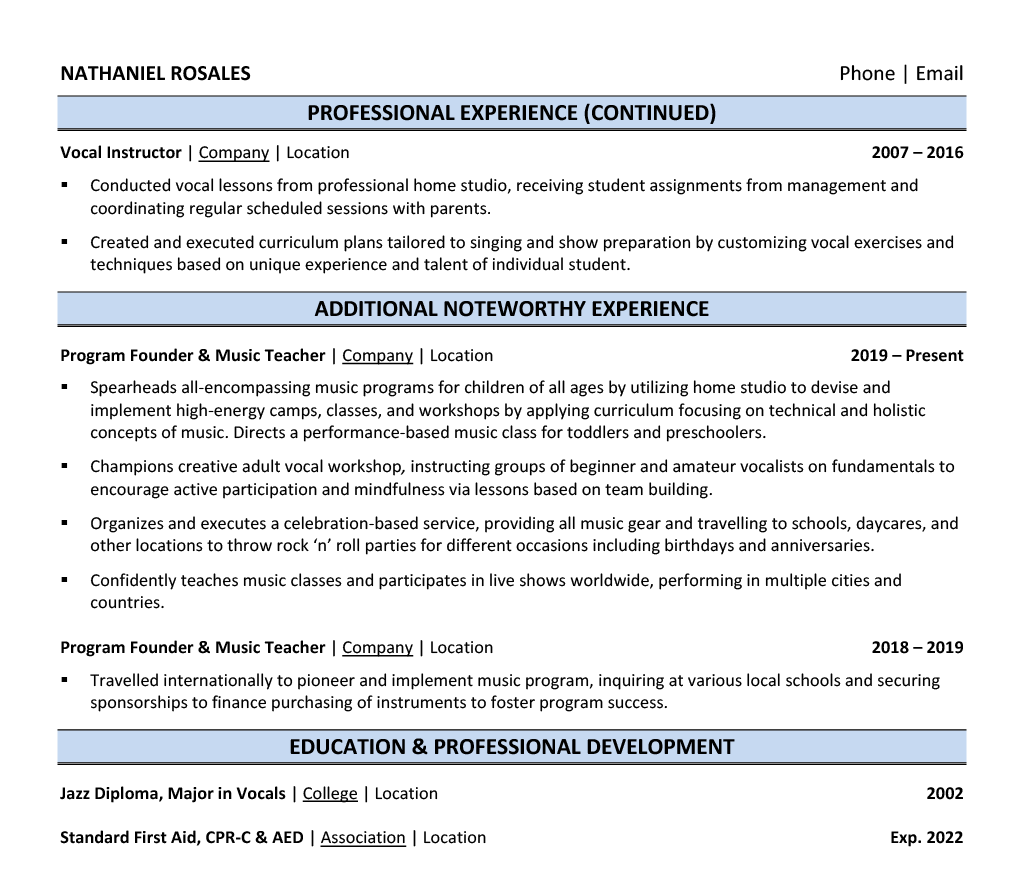

Music teachers face a unique challenge: proving their impact goes far beyond teaching notes and rhythms. Your expertise shapes young minds and builds essential life skills, but capturing that on paper often falls flat.
Are you struggling to showcase both your musical mastery and your teaching excellence? A well-crafted resume can demonstrate how you transform students' lives while meeting educational standards and performance goals.
Resume Target specializes in helping music educators compose resumes that sing. We'll help you orchestrate your achievements into a powerful story that shows administrators exactly why you're the perfect conductor for their program.


As the architects of musical discovery, Music Educators do far more than teach notes on a page - they shape students' understanding of fundamental concepts like rhythm, melody, pitch, and tempo, while nurturing creative expression and building confidence through performance.
Your role as a Music Educator involves orchestrating engaging lessons that blend theory with hands-on practice, conducting vocal and instrumental exercises, directing ensembles, and creating opportunities for students to showcase their developing talents through concerts and performances.
Whether you're interested in teaching elementary school choir or leading a high school jazz band, the path to becoming a Music Educator offers diverse opportunities for growth, from expanding your instrumental expertise to mastering new teaching methodologies that will help you inspire the next generation of musicians.
Let's talk about the exciting earning potential in music education! Your passion for teaching music can translate into a rewarding career, especially at colleges and universities where compensation tends to be more competitive than at community colleges. The opportunities to advance and increase your earnings grow with your experience and responsibilities.
Figures from: U.S. Bureau of Labor Statistics
Music educators can progress from classroom teaching to leadership roles in education and administration. With experience and additional credentials, you can advance to positions with greater responsibility and higher earning potential.
Beyond basic musical proficiency, advancing your career requires a blend of technical expertise and leadership capabilities that evolve with educational trends and technology.
- Advanced Conducting and Performance Techniques - Digital Music Education Technology - Curriculum Development and Assessment - Student Engagement and Mentorship - Pedagogical Innovation - Cross-Cultural Music Education - Program Management - Collaborative LeadershipBreaking into music education starts with combining your passion for music with hands-on teaching experience, whether through private lessons, assistant teaching, or community music programs.
To build a successful career in music education, you'll need to develop key competencies including flexible pedagogy and instructional design, which form the foundation of effective music teaching and student engagement.
Requirements from National Association for Music Education
From bustling urban districts to thriving suburban schools, music education jobs span public, private, and community sectors.
Figures from U.S. Bureau of Labor Statistics
Struggling to compose the perfect resume that hits all the right notes about your teaching experience, musical expertise, and student achievements? Follow our section-by-section guide to create a harmonious Music Educator resume that will resonate with hiring managers.
As a music educator, you know how to break down complex musical concepts for students, yet summarizing your own career achievements can feel like composing a symphony in just four measures.
While you excel at nurturing musical talent and orchestrating engaging lessons that inspire young musicians, translating these dynamic teaching abilities into a compelling written summary often strikes a discordant note with hiring managers who need to quickly understand your value.
How would you describe your overall teaching philosophy and approach to music education in a way that sets you apart from other music educators?
Reason: Your teaching philosophy is the foundation of your professional identity and helps employers understand your unique value proposition. This high-level perspective immediately communicates your educational mindset and pedagogical approach.
What combination of musical disciplines and age groups have you taught throughout your career that showcase your versatility as a music educator?
Reason: Highlighting your range of expertise across different musical areas and student populations demonstrates adaptability and comprehensive knowledge, which are highly valued in music education roles.
How do you integrate technology and contemporary teaching methods with traditional music education principles in your classroom?
Reason: Modern music education requires a balance of traditional and innovative approaches. This question helps articulate your ability to evolve with the field while maintaining educational excellence.
As a music educator, you need to showcase both your musical expertise and your teaching abilities, making your skills section particularly nuanced and multifaceted.
From conducting ensembles and teaching music theory to managing classroom behavior and developing curricula, your resume should reflect the full spectrum of technical musical knowledge and educational competencies you bring to the role.
Showcase your teaching journey by organizing your experience into three impactful sections: your role overview highlighting your teaching environments, your measurable achievements in student performance and program growth, and your core responsibilities in curriculum development and music instruction.
Many music educators struggle to translate their artistic and instructional impact into concrete, measurable accomplishments that administrators can understand. Transform your musical and pedagogical victories into powerful metrics by connecting student growth, performance achievements, and program development to specific outcomes that demonstrate your educational value.
A strong responsibilities section demonstrates how Music Educators shape students' musical development beyond basic instruction. Your duties should showcase both technical music expertise and teaching abilities while connecting your impact to overall educational outcomes and student success.
Your music education credentials demonstrate both your academic foundation and teaching qualifications. Lead with your highest degree and most relevant teaching certifications, especially state licensure and specialized methodologies like Kodály or Orff-Schulwerk certification.
Now that you've created a strong foundation using Resume Target's comprehensive resume writing guidelines, you're ready to transform your resume into a powerful tool for landing your dream teaching position.
While many music educators focus solely on customizing their cover letters, tailoring your resume for each specific school or program is equally crucial for showcasing your unique teaching philosophy, musical expertise, and educational accomplishments.
A customized resume not only helps you navigate through ATS systems by incorporating relevant keywords from the job posting, but it also demonstrates to hiring administrators that you've thoughtfully aligned your experience and qualifications with their specific music program needs and educational values.
Ready to orchestrate your career success? Let's fine-tune your resume to hit all the right notes with potential employers and conduct your way to your next exciting music education opportunity!
Don't let a lack of formal teaching experience hold you back from pursuing your dream career as a Music Educator!
Your musical background, education coursework, and student teaching experiences can create a compelling story that shows you're ready to lead a classroom.
Focus on highlighting your musical proficiencies, teaching methodology coursework, and any practicum or student teaching experiences to create a standout resume.
For detailed guidance on structuring your education credentials and teaching experiences, check out the Student Resume Writing Guide.
Your summary section is your chance to showcase your musical expertise, teaching philosophy, and the unique energy you'll bring to the classroom environment.
Focus on combining your musical accomplishments, student teaching experience, and educational credentials to create an engaging narrative that resonates with school administrators.
"Passionate and creative Music Educator with comprehensive training in instrumental and vocal instruction, plus hands-on experience through student teaching and ensemble leadership. Demonstrated success in directing middle school band program during student teaching practicum, leading 40+ students to superior ratings at district festival. Skilled in piano, violin, and vocal instruction, with additional expertise in music technology and adaptive teaching methods. Seeking to inspire the next generation of musicians while building a dynamic, inclusive music program."
Now's your chance to showcase the depth and breadth of your musical training in a way that resonates with school administrators and hiring committees!
Don't just list your degrees - highlight your specialized coursework in music theory, conducting, and pedagogy, plus standout projects like student recitals you've directed or innovative teaching methods you've mastered during your studies.
Courses common to a Music Educator degree/certification include Music Theory, Aural Comprehension, Music History, Keyboard Skills [1], Conducting, Music Methods, Techniques for Teaching Music to Children, Music in Education, Ethnomusicology in the Schools, Instrumental Curriculum: Methods and Materials, Music for Children, Classroom Management and Evaluation in Music Education [2], Student Teaching [1, 2], and Participation in Ensembles [1].Relevant Coursework: Music Theory | Conducting | Music Methods | Classroom Management and Evaluation | Instrumental Curriculum | Music for Children
Key Projects:
Student Teaching Practicum: Developed and implemented comprehensive music curriculum for grades 6-8, resulting in successful winter concert performance and increased student participation in music programs.
Elementary Music Program Development: Collaborated with mentor teacher to create and execute an inclusive music education program for K-5 students focusing on multicultural musical experiences.
Transform your academic training, student teaching experience, and musical expertise into a compelling skills section that showcases your readiness to inspire and educate the next generation of musicians.
As an entry-level Music Educator, your combination of musical talent and teaching capabilities positions you perfectly for a rewarding career shaping students' artistic development and fostering their love for music.
Let's face it - capturing the magic of your classroom leadership and musical impact on paper feels about as easy as teaching a whole orchestra in one day! As a music educator, you know your influence extends far beyond notes and rhythms, but expressing that profound impact in resume-friendly language can be truly challenging.
At Resume Target, we understand the unique dynamics of education careers and specialize in showcasing both your technical musical expertise and your transformative teaching abilities.
Our team has helped countless music educators highlight their successes - from growing award-winning programs to improving student engagement rates - in ways that resonate with hiring administrators.
With districts finalizing their hiring decisions for the upcoming school year, now is the perfect time to transform your resume into a powerful career tool - let's connect today to discuss your unique story!
Impress any hiring manager with our Education resume writing service. We work with all career levels and types of Education professionals.
Learn More → Education Resume Writing Services